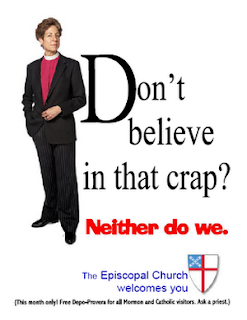From the time they married in 1951, my parents were members of the Episcopal Church. Mom had been raised more or less Southern Baptist, and Dad Presbyterian. They decided to split the difference and join a new church. Dad, in his later years, became a lay-person (for those not schooled in the church lingo, he wasn’t a priest but was able to serve communion to the parishioners) and was active in his men’s group. One of my favorite stories about him is at a meeting where the priest asked the group to answer the question “Why are you a Christian?” As they went around the circle, men responded with the usual, “To serve others” and “To follow Christ”. When it was my dad’s turn, he answered “Accident of birth.” There were gasps and raised eyebrows. He just shrugged. It was the truth.
From my early days, the church was an integral part of our family life. There are pictures of me as a baby at my baptism, of me standing in the foyer of the church in Shreveport, and others of my sisters in their choir robes. In the 1960s women still had to cover their heads in the sanctuary, (relics of the Catholic church from which the Episcopal church sprang, perhaps?) and I can still see my sisters in their tiny lace veils. In Tokyo, we attended St. Alban’s Episcopal Church. Many of our family friends were church folks. In Connecticut we went to a beautiful New England stone church with a Norman belfry.
In our first stint in Baton Rouge, we started going to Trinity Episcopal Church on Stanford Avenue (and continued going there when we moved back). The building was over-the-top contemporary, with sleek lines and blonde wood. Typical late 1960s, early 1970s architecture. It was here that I was confirmed in 1973. The bishop made the sign of the cross in holy oil (felt more like Vaseline) on my forehead, and I was an official Episcopalian. In those days you didn’t take communion until you were confirmed, and as a child I would kneel at the communion rail with my arms crossed over my chest. The officiant would come around and say a blessing with his hand on my head. It was an exciting transition into the adult world after my confirmation, and I could participate in the actual communion rite. Eating the little bread wafer and sipping the wine from the elegant silver chalice was a mystical experience for me. Today children of all ages are allowed to take communion, a change that I don’t really like; there was something monumental about that rite of passage. But who am I to judge? It’s not like they asked me …
 |
| Gotta love those Whiskeypalians! |
In Manila, we attended Trinity Episcopal Church (Trinity seems to be a common theme in my life, and I ended up going to Trinity University for college. Surrounded by the Trinity!!) The rector was an interesting fellow: he was Belgian, having originally come to the Philippines as a Jesuit (Catholic) priest. He taught at a school in one of the outlying provinces and one of his students was a beautiful young Filipina. They caught each other’s eye (so the legend went) and that was that. He left the Catholic church (which forbids priests from marrying) and became an Episcopalian priest (who can marry; it’s not called Catholic “lite” for nothing). They married and had several beautiful Eurasian children (one of which I dated for a while, but that’s another story!) His name was Father Dimanche, which means “Sunday” in French. Ironic, non? He had a beautiful French accent, which made the boring sermons a little easier to listen to, I can’t deny it.
My dad was instrumental in building a columbarium at the church. A columbarium is a building like a mausoleum, in which the ashes (rather than the body) of the deceased are interred. It was a huge project, and I think Dad was involved in the design and the implementation of its construction. It was a big deal, and there was a huge party after the dedication ceremony. I have a silly fantasy of returning to the Philippines some day with my dad’s ashes and having them stored in the columbarium that he worked so hard to build. My mom was a faithful member of the altar guild, starching the linens, polishing the brass and silver.
Episcopalians are sometimes jokingly called “Whiskeypalians” because they subscribe to the notion that Jesus turned water into wine at the Wedding at Canaan, and therefore, we should drink lots and lots of wine (and other potent potables!) At a church bazaar that we had once, there was a ring toss game. Throw the ring on the bottle of booze and you get to take it home! There were many many liquored up parties at my parents’ house that were church functions. There were lots of soirées at the church: a Mad Hatter party (cute pictures of grown-ups wearing huge silly hats and holding up cocktail glasses). The youth group sponsored Shrove Tuesday pancake dinners. For some reason the awkwardness that I felt at school disappeared when I was at church. I felt empowered, like a leader. I was voted the president of the youth group. We had lots of pool parties at each other’s houses, and took trips to the beach. But that’s all it was for me: one big party. The actual meaning of the church was secondary (or even tertiary).
 |
| So serious. |
To be continued …



No comments:
Post a Comment